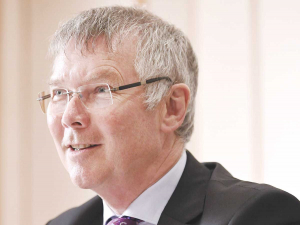Urgent action needed to restore Waikato lakes' health
Waikato is home to a diverse range of lakes, and experts say they urgently need better management and restoration.
 Environment Minister David Parker says the objective of the reforms is to stop any further degradation of NZ’s freshwater and to see water quality improve within five years.
Environment Minister David Parker says the objective of the reforms is to stop any further degradation of NZ’s freshwater and to see water quality improve within five years.
A massive reform programme aimed at cleaning up the country’s waterways has been announced by the Government.
The plan, announced at Parliament last Thursday by Environment Minister David Parker and Agriculture Minister Damien O’Connor, will require some immediate action on farms while other actions will be phased in over a number of years.
In terms of farming changes, it includes a number of measures aimed at reducing pollution in rivers and streams.
For example, by 2023, dairy cattle will have to be excluded from waterways over a metre wide and other cattle and deer by July 2025.
Farmers will also have to apply for resource consent before converting more than 10 hectares of land to dairy farming. The same rules will apply to other forms of livestock intensification.
Fences must be three metres back from a stream. However, any permanent fencing closer to the stream will be deemed acceptable.
On land with a slope of less than 10 degrees all beef cattle and deer must also be excluded from waterways of more than a metre wide by 2025.
The issue of excluding stock from streams on hill country will be addressed through a combination of mandatory farm plans and regional council plans – all of which must be based on the country’s National Policy Statement on water.
There will also be limits placed on the use of nitrogen, and dairy farmers will be required to report annually to regional councils on the quantity of nitrogen that they have applied per hectare.
Also, there are special rules relating to the protection of wetlands, winter grazing and provisions for grazing animals on forage crops.
Primary sector and other groups will be financially assisted with the implementation of the new clean water standards through a $700 million fund.
“Cleaning our waterways will secure the future of our meat, dairy and other primary exports and ensure they continue to earn higher prices overseas. It makes both economic and environmental sense,” says Environment Minister David Parker.
Agriculture Minister Damien O’Connor says New Zealand’s high-value overseas consumers want greater assurances that the food and fibre they buy is produced in a sustainable way. He says clean water and sustainable farming is entwined with the economic success of the sector.
“The proposals appear to be an improvement on earlier plans, but the Government has only released a high-level summary of its proposals and the devil is always in the detail,” Beef+Lamb NZ chief executive Sam McIvor says.
Federated Farmers Chris Allen says the proposals still have some sharp edges that will bite our farmers and rural communities at a time when we need it least.
“If the regulations are shown to be flawed or impractical, the Government needs to be open to changing them.”
According to the latest Federated Farmers banking survey, farmers are more satisfied with their bank and less under pressure, however, the sector is well short of confidence levels seen last decade.
Farmer confidence has taken a slight dip according to the final Rabobank rural confidence survey for the year.
Former Agriculture Minister and Otaki farmer Nathan Guy has been appointed New Zealand’s Special Agricultural Trade Envoy (SATE).
Alliance Group has commissioned a new heat pump system at its Mataura processing plant in Southland.
Fonterra has slashed another 50c off its milk price forecast as global milk flows shows no sign of easing.
Meat processors are hopeful that the additional 15% tariff on lamb exports to the US will also come off.